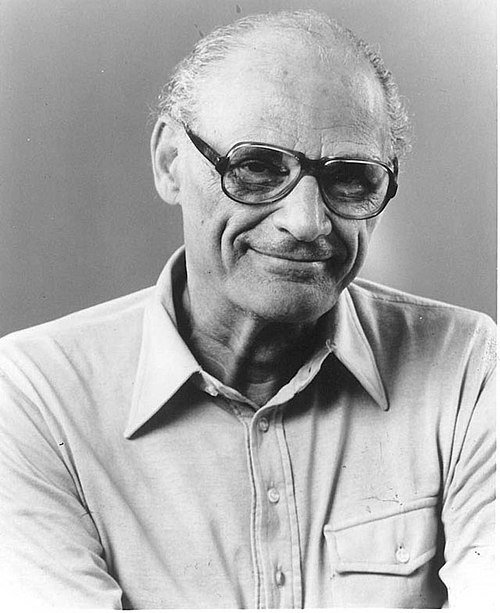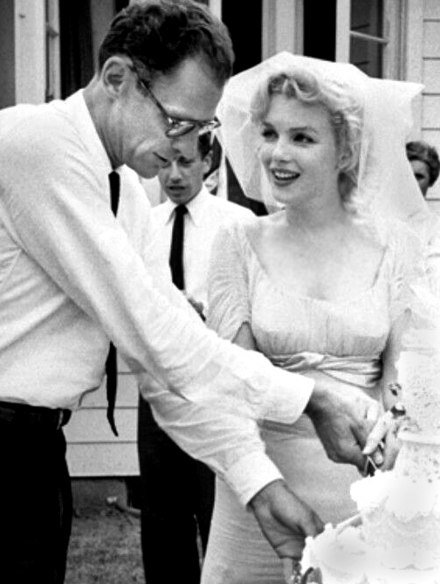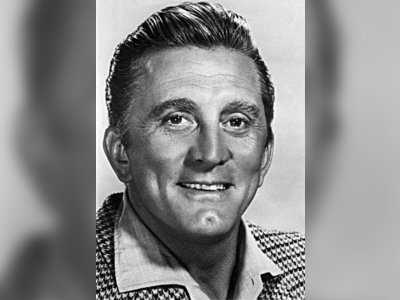מורשת גדולי האומה
בזכותם קיים
beta
Arthur Miller: A Playwright's Quest for Truth
In the world of theater, one name shines brighter than most—a name synonymous with powerful drama, social commentary, and a relentless quest for truth. Join us as we explore the life, heritage, legacy, and profound contributions to the Jewish community and heritage of Arthur Miller.
Arthur Miller was born on October 17, 1915, in Harlem, New York, to a Jewish immigrant family. His parents, Isidore and Augusta Miller, instilled in him a deep sense of cultural heritage and social justice from a young age.
Growing up during the Great Depression, Miller witnessed the struggles of working-class families and developed a keen sense of empathy for their hardships.
Arthur Miller's journey as a playwright began with his first major success, "All My Sons," a gripping exploration of war profiteering and its moral consequences. However, it was his iconic work, "Death of a Salesman," that catapulted him to international acclaim.
This powerful drama exposed the American Dream's underbelly, delving into the psyche of its protagonist, Willy Loman, as he grapples with disillusionment and despair.
Miller's masterpiece, "The Crucible," not only portrayed the Salem witch trials but served as an allegory for the McCarthy era's rampant paranoia and the destructive power of fear and intolerance.
As a Jew, Miller's heritage deeply informed his understanding of persecution and the dangers of collective hysteria.
Beyond his creative work, Arthur Miller was a passionate advocate for social justice. He refused to name names during the McCarthy hearings, standing up for his principles even when it meant personal sacrifice.
His commitment to civil rights, human dignity, and the Jewish community left an indelible mark on American society.
Arthur Miller's biography, heritage, and legacy serve as a reminder that art can be a powerful vehicle for truth and justice. His works continue to inspire playwrights, actors, and activists around the world.
In the words of Arthur Miller, "The theater is so endlessly fascinating because it's so accidental. It's so much like life."
Arthur Miller's relentless quest for truth, his exploration of the human condition, and his unwavering commitment to his Jewish heritage have left an enduring legacy. He remains an exemplar of the transformative power of storytelling and the enduring strength of Jewish values.
Growing up during the Great Depression, Miller witnessed the struggles of working-class families and developed a keen sense of empathy for their hardships.
Arthur Miller's journey as a playwright began with his first major success, "All My Sons," a gripping exploration of war profiteering and its moral consequences. However, it was his iconic work, "Death of a Salesman," that catapulted him to international acclaim.
This powerful drama exposed the American Dream's underbelly, delving into the psyche of its protagonist, Willy Loman, as he grapples with disillusionment and despair.
Miller's masterpiece, "The Crucible," not only portrayed the Salem witch trials but served as an allegory for the McCarthy era's rampant paranoia and the destructive power of fear and intolerance.
As a Jew, Miller's heritage deeply informed his understanding of persecution and the dangers of collective hysteria.
Beyond his creative work, Arthur Miller was a passionate advocate for social justice. He refused to name names during the McCarthy hearings, standing up for his principles even when it meant personal sacrifice.
His commitment to civil rights, human dignity, and the Jewish community left an indelible mark on American society.
Arthur Miller's biography, heritage, and legacy serve as a reminder that art can be a powerful vehicle for truth and justice. His works continue to inspire playwrights, actors, and activists around the world.
In the words of Arthur Miller, "The theater is so endlessly fascinating because it's so accidental. It's so much like life."
Arthur Miller's relentless quest for truth, his exploration of the human condition, and his unwavering commitment to his Jewish heritage have left an enduring legacy. He remains an exemplar of the transformative power of storytelling and the enduring strength of Jewish values.
- ארתור מילרhe.wikipedia.org







